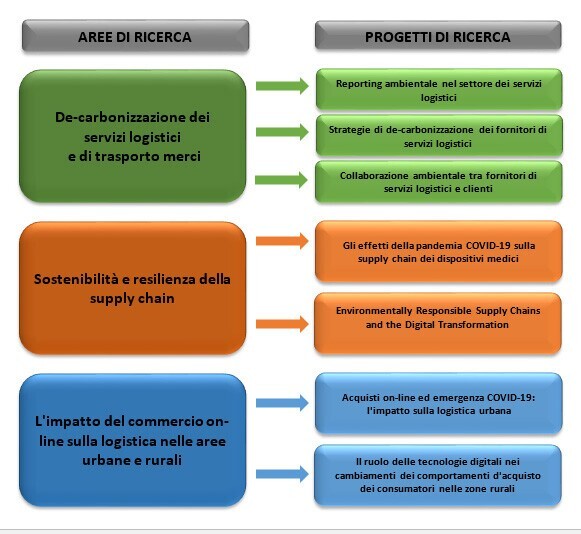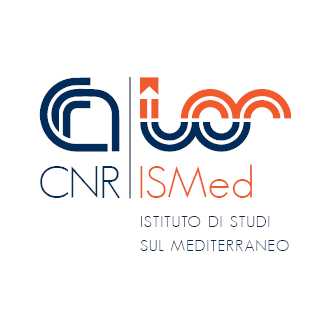Sustainable Logistics Laboratory
Manager: Pietro Evangelista
Abstract
The Mediterranean is a space of relations between countries with strong differentials in growth, economic development and democracy. Thus, as in a microcosm, the Mediterranean region reflects the great challenges of the new millennium: demographic growth, unemployment, migration, reform of welfare policies, combating poverty, the effects of climate change, and the management of conflicts over the control of natural resources in the southern and eastern sides of the basin. Institutions and the quality of governance play a central role in addressing these challenges because corruption, rentier positions, and a public administration incapable of guaranteeing transparency, fairness, and equal social and gender opportunities hinder growth and socio-economic development in all Mediterranean countries. Similarly, in the area, the functioning of real and financial markets differs from country to country and region to region, resulting in great disparities in the efficiency with which businesses operate and markets allocate resources, and conversely, strong sector and product specialisations. However, these disparities also represent great opportunities for trade and growth for all countries in the area. The line’s research activity analyses, across a broad spectrum, the governance and institutional processes in the Mediterranean countries and the intersections of these with the mechanisms that regulate the functioning of markets and individual enterprises. With the ultimate aim of highlighting the limits to the development of the countries on the southern and eastern shores and of suggesting recipes for revitalising the anaemic growth of the countries on the northern shore, the line’s activities are part of the ongoing debate on the need to rethink governance in the Mediterranean, with particular reference to EU policies, the reduction of territorial gaps and security.
Goals
In recent decades, sustainability issues have attracted growing interest in society at large and in the business community as sustainable development is seen as a promising paradigm for achieving a more equitable world in which natural resources and the environment are preserved for future generations.
The concept of sustainability is based on the integration of the three social, economic and environmental pillars. From a business perspective, the environmental dimension of the sustainability concept involves all activities and decisions necessary to minimise the environmental pollution caused by a company. The need to reduce the negative impact on the environment has become a significant priority for companies operating in the supply chain due to various factors, such as pressure from governments and supranational organisations, concerns over the scarcity of critical energy resources and increasing greenhouse gas (GHG) emissions.
The logistics services sector is a key component of trade and contributes to economic growth in many countries. However, logistics activities generate heavy negative environmental impacts, particularly those caused by freight transport. Against this backdrop, the environmental management of logistics and freight transport activities has become an important element in achieving a greener supply chain and companies are under increasing pressure to take measures to reduce the negative externalities (mainly carbon emissions) of their logistics activities along the supply chain.
This has led to increasingly stringent environmental concerns due to a number of specific factors. Firstly, transport and logistics activities are the second largest contributor of greenhouse gases after electricity production globally. In the European Union, greenhouse gas emissions from this sector have increased at a higher rate than all other economic sectors in recent decades. Secondly, the demand for freight transport has grown significantly in recent years and is expected to continue to grow in the coming years. Finally, increased global warming and the recent economic crisis have imposed a greater need for more sustainable logistics services. As a result, environmental sustainability has rapidly become an expected dimension in the provision of logistics services and requires the adaptation of activities and strategies from a green perspective in order to reduce negative environmental externalities.
From a research perspective, most studies on environmental problems in logistics and the supply chain have focused on the manufacturing sector, while little attention has been paid to the logistics services sector.
Faced with this scenario, the ‘Laboratory on Sustainable Logistics’ of the CNR-ISMed has started to operate, whose main objective is to develop research activities on the topic of environmental sustainability in freight transport and logistics in order to spread the culture of sustainability in the sector and help companies to develop strategies and actions to counter the effects of climate change.
In fact, in Italy the approach towards sustainable logistics is little used and decarbonisation programmes are scarcely adopted by Italian companies, especially in the case of logistics and freight transport companies, as documented by recent research carried out within the Laboratory itself and at an international level.
The specific objectives of the Laboratory are: i) to raise the awareness of businesses and key stakeholders about the impact of logistics and freight transport activities on climate change; ii) to collect and disseminate data on sustainable logistics in Italy to produce analysis and research on key issues; iii) to provide solutions to help businesses facing the challenges of sustainable logistics; and iv) to contribute to the definition of policies aimed at reducing the environmental impact of logistics and freight transport.
Activity
The Laboratory’s research activities are developed through the use of quantitative and qualitative techniques using both primary and secondary data. The research has a mainly applicative approach but theoretical/conceptual approaches are not excluded. Given the different dimensions of the phenomenon being investigated, multidisciplinary scientific contributions and activities are desirable.
The Laboratory develops the following three activities:
Research
- measure in quantitative and qualitative terms the Green Logistics phenomenon in Italy using primary data to be collected in the field through dedicated surveys.
- analyse in depth the factors influencing the adoption of decarbonisation programmes and actions and identify ways to overcome inertia and barriers.
- identify and bring to light “best practices” both in Italy and in other foreign countries to be shared and transferred to Italian companies.
- develop a forum for discussion with companies on the subject of environmental sustainability based on the results of the research and surveys carried out.
The Laboratory develops research activities according to a multi-year work plan involving universities, research centres, companies and institutions both in Italy and abroad.
Enterprise Support
- transferring the main carbon footprint methodologies to companies in order to carry out supply chain (or individual company) de-carbonisation studies and analysis of the areas where the greatest energy inefficiencies are generated.
- identify the most suitable actions to eliminate inefficiencies and reduce the environmental impact of logistics and transport activities.
- help companies fulfil environmental reporting and regulatory requirements.
- increase the preparedness of companies to cope with future policy and regulatory developments on climate change.
Training
- design and promote environmental training programmes to retrain and/or update the skills of personnel working in companies.
- Design and promote training programmes to facilitate the acquisition of new skills related to environmental sustainability in logistics.
Themes
The issues addressed are many and interconnected. The main research topics under development are listed below:
- Decarbonisation strategies of logistics service providers
- Environmental reporting in the logistics services sector
- Environmental collaboration between logistics service providers and customers
- The effects of the COVID-19 pandemic on the medical device supply chain
- Environmentally responsible supply chains and digital transformation
- Online procurement and COVID-19 pandemic: the impact on city logistics
- The role of digital technologies in changing consumer purchasing behaviour in rural areas
Contacts and collaborations
- Lappeenranta University of Technology – LUT (Finland)
- Wroclaw University of Economics (Poland)
- Linköping University – Division of Logistics Management (Sweden)
- Heriot-Watt University
- Logistics Research Centre (UK)
- University of Pau and the Pays de l’Adour (France)
- Scuola Universitaria Superiore Sant’Anna di Pisa
- School of Management
- Politecnico di Milano
- Green Transition Hub – LUIC Università Carlo Cattaneo
- Associazione SOS Logistics
- Smart Freight Centre.

Main collective research products
Articles in international indexed journals already published in 2022:
– Kähkönen, A.K., Evangelista, P., Hallikas, J., Immonen, M., Lintukangas K. (2021) COVID-19 as a Trigger for Dynamic Capability Development and Supply Chain Resilience Improvement, International Journal of Production Research.
– Lo Storto, C., Evangelista, P., (2022) Infrastructure efficiency, service quality and environmental impact of land logistics systems in the EU: A DEA-based dynamic mapping, Research in Transportation Business and Management.
– Evangelista, P., Hallikas, J. (2022) Exploring the influence of ICTon sustainability in supply management: evidence and directions for research, Cleaner Logistics and Supply Chain.
– Jamal El Baz, J., Evangelista, P., Jebli, F., Iddik, S., (2022) Assessing green innovation in supply chain management research: A systematic review based on causal mechanisms framework, International Journal of Logistics Management.
Articles in forthcoming international indexed journals:
– Colicchia C., Creazza A., Evangelista P., (2022). Leveraging shippers-logistics providers relationships for better sustainability in logistics: the perspective of SMEs. International Journal of Logistics Management.
– Evangelista, P., Hallikas, J., Kähkönen, A.K., Lintukangas, K., Immonen, M. (2022). The influence of COVID-19 on the management of supply chain resiliency and risks: an exploratory study in the medical device industry, International Journal of Logistics: Research and Applications.
– Grant, D.B., Shaw, S., Sweeney, E., Bahr W. Chaisurayakarn, S., Evangelista P. (2022). Using mixed methods in logistics and supply chain management research – current status and future directions, International Journal of Physical Distribution and Logistics Management.
– Kianto A., Evangelista P., Hussinki H., Vanhala M., Nisula A.-M. (2022). Knowledge-based human resource management, logistics capability, and organizational performance in small Finnish logistics providers, Logistics.
International indexed book chapters already published in 2022:
– Hallikas, J., Evangelista, P., Lintukangas, K., Kähkönen, A.K., Immonen, M. (2022) Covid-19 disruption impacts on supply chains: An empirical exploration on disruptions, resiliency and risk management strategies, in Zdisin, G. et al. (2022) Supply Chain Resilience: Reconceptualizing Risk Management in a Post-Pandemic World, Springer.
International indexed books being published:
– Evangelista P., Hallikas J. Jaber M.Y. (2023) Environmentally Responsible Supply Chains in an era of Digital Transformation: Research Developments and Future Prospects, Edward Elgar Publishing Limited.
Special issues in international indexed journals:
Maja Kiba-Janiak, Michael Browne, Russell Thompson and Leise de Oliveira, Pietro Evangelista (2022) numero speciale per la rivista Sustainability intitolato ”Sustainable Last Mile Delivery and Returns on E-commerce Market”
Last update
2 February 2024, 12:27

 CNR – ISMed
CNR – ISMed